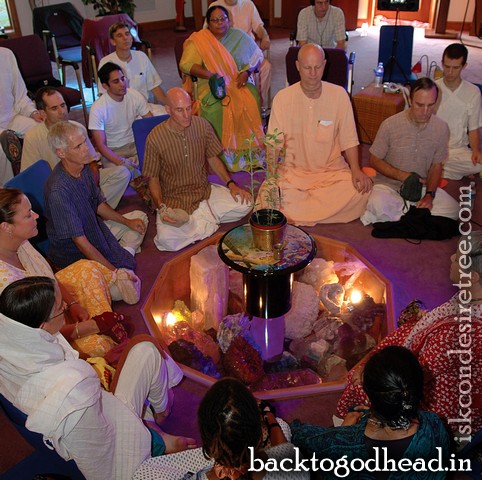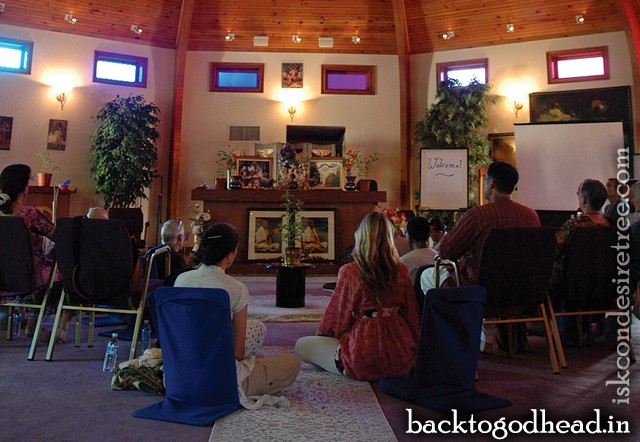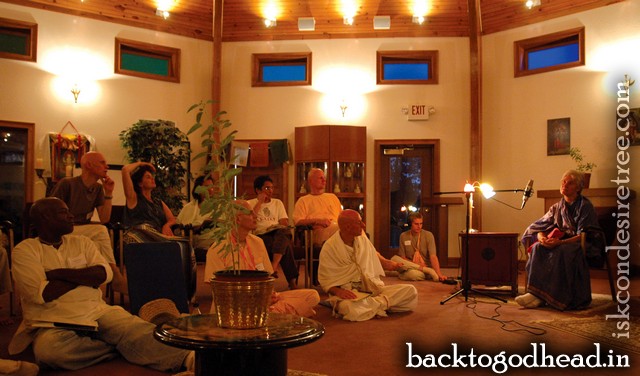Devotees take time out to get away from their normal routines and focus on the essential practice of japa, individual chanting of the holy names. Instructors and attendees at a japa retreat at Delphi University in the Blue Ridge Mountains of Georgia, USA (above and left). The author is in the center of the photo, kneeling, with a light-colored shawl folded over her shoulder.
Picture yourself on a beautiful vacation away from the distractions of home and work. Fresh air, dense forests, and tall blue mountains surround you, and you have the chance to meet with experienced teachers to explore the great spiritual benefit of chanting the Hare Krishna maha-mantra. When the alarm goes off you’re not obliged to rise to another day on the job; instead you rise to hear a running stream of nectar from the mouths of devotees who have dedicated their lives to the sweet chanting of Hare Krishna, Hare Krishna, Krishna Krishna, Hare Hare/ Hare Rama, Hare Rama, Rama Rama, Hare Hare. Through singing, discussions, interactive exercises, delightful group practices, and many sweet loving exchanges among devotees, you are gently nudged toward perfection in chanting.
Is such vacationing an indulgence? No. Our spiritual authorities recommend the hearing and chanting of Krishna’s names as the most important service a devotee can do. Chanting is the best way to meditate on the Lord and feel His presence. The maha-mantra is a prayer: “Lord Krishna, please engage me in Your devotional service.” Yet our busy lives often deny us the time or proper atmosphere we need to slow down and pay attention.
Everyone requires a vacation now and then, but devotees tend to require more from a holiday than renting a car and staying in hotels. Even a trip to holy places in India can be fraught with distractions. The Japa Retreat, now being conducted by ISKCON devotees in various parts of the world, affords an opportunity to vacation and develop spiritual practice in a beautiful, secluded mountain setting, or near the ocean, or in a holy place in India.
Re-Treating Myself
For those like me who have been chanting for years yet harbor regrettable habits, the Japa Retreat was a way to re-treat myself to a full deep drink of the nectar of the holy names. I found myself saying, “Oh, now I remember why I became a Hare Krishna!”
The Japa Retreat I attended, in the Blue Ridge Mountains of Georgia, came through the agency of Bhagavat Life, a service organization created by Purusa Sukta Dasa and Divyambara Devi Dasi.* Their desire to organize Japa Retreats (the one described in this article is the fifth in the U.S.) comes from the inspiration of His Holiness Sacinandana Swami. Having had many insights about chanting, Sacinandana Swami suggested chanting retreats to revitalize devotees who would like to get back to “our real business.”
Sacinandana Swami has said, “Our problem is that we do not wish to enter the struggle of the inner life of good japa. But without making this endeavor, without considering japa essential to our service to Krishna, other services tend to fail. As you assess this retreat in the weeks that follow it, you’ll understand that you have been given a lot more than you expected to help you toward the goal of effective chanting.”
Tools for Better Chanting
One of our teachers at the retreat was Mahatma Dasa, whom I remembered from San Diego as a highly qualified trainer of new devotees. He asked us to rate our japa on a scale of one to ten, from horrible to perfect. Most of us had to rate ourselves at four or five, levels he said meant being just attentive enough to stay afloat in the nectar of the holy names. We were chanting just well enough to stay devotees of the Lord. If being a five could afford us that much, then what would it be like to increase to a six, or maybe even an eight? Were we ready for freedom from all material anxiety and the pure devotional service that comes from sweet, intense japa?
Mahatma spoke on a number of tools for a better relationship with the holy names, including a sacred space and introspective writing.
The Sacred Space
He first described that any successful chanter needs a “sacred space.” Where do you put yourself when you begin to chant? We should be where we can welcome the maha-mantra as we would a most important guest, with all attention and respect.
Some places help us hear Krishna’s name, and others don’t. For example, a temple, a temple room in one’s home, or a peaceful garden may be without distractions. The TV room probably won’t be.
Sacred space has a lot to do with timing. It’s hard to chant in the midst of household activities, so schedule your japa for a time with the fewest distractions. Scripture recommends the early morning hours before sunrise as an especially peaceful time. If you can chant with like minded persons, that too will be of great help.
Perhaps more intrinsic is the sacred space between one’s mouth and ears, the path the holy name travels. Smaller than a garden or a room, it is a direct route to one’s soul. In this sacred space there can be melting of the heart when we try to hear the sound in an earnest and humble mood.
Another useful tool is to write answers to relevant questions: How has the holy name influenced my life? How am I grateful to the holy name? Where do I need to improve my relationship with the name?
One Mantra at a Time
Narayani Devi Dasi, a Prabhupada disciple who has served in his temples in India for many years, gave us several useful insights into the chanting of the holy name. Her slogan is “one mantra at a time.”
After trying repeatedly to sincerely hear one mantra at a time, I came to wonder, is it possible I chant entire rounds of 108 mantras without hearing even one? Do I regularly let my mind sabotage my practice? She urged us to just try to carefully listen to only one mantra at a time and to be in the present. We chanted together in unison. Like a child learning to read, I felt rewarded by the struggle.
Narayani led us in a beautiful analysis of the Siksastaka prayer of Sri Caitanya Mahaprabhu. Each of the eight verses represents an essential quality of one who practices the chanting: gratitude, lamentation, humility, taste, dependence, longing for perfection in devotion, feeling separation, and complete surrender. We were asked to think of examples in scripture of great devotees who demonstrate these various qualities.
Narayani coached us through an exercise in which she asked us to envision our favorite deity or picture of Krishna, and together we chanted a round dedicated to Him. We chanted His names to Him, chanting as attentively as possible. This meditation was blissful, as the focus was to offer the sound of the names for the pleasure of the holy name—that supremely beautiful Lord of our hearts.
Hatha Yoga
Devotees adept in hatha yoga explained how physiology affects psychology. Our movements and conduct during the day tend to disperse our energy, yet we can channel that energy into attentive japa. To do this an alert and aware mind must precede the chanting. We practiced a few exercises and breathing techniques before chanting. The exercises emphasized sitting with the spine straight and the head and neck in a good position for chanting.
Improper breathing while chanting japa makes us lose the rhythm and experience yawning or shortness of breath. Practice of pranayama breathing techniques can help.
Are You Ready for The Shock of Your Life?
Yajna Purusa Dasa, one of the instructors, told us he chants sixtyfour rounds of Krishna’s holy names on his beads every Monday to help him meet the demands of being a temple president. One feature of the retreat was to chant sixty-four rounds ourselves, so we listened to what he had to say, knowing our success would depend upon it. He described how the mind is always engaged in two activities: accepting and rejecting.
“This accepting and rejecting goes on to placate the ego. In a mood of surrendering the false ego to the lotus feet of the Lord, we should give the foolish rascal mind a simple instruction: ‘Just try to hear one mantra.’ And if you do manage to hear one mantra, then praise yourself. And don’t forget, you are one small step closer to meeting Krishna, the Supreme Personality of Godhead.
“Are you ready to meet Krishna? Are you ready for the shock of your life? How very sweet and beautiful that will be! If you do hear one mantra, it will be so pleasurable that you won’t be able to wait to hear and chant the next one!
“If you give the rascal mind a chance to hear Krishna’s names, it will say, ‘Hey, what was that?’ Eventually we will come to a point where the holy name will embrace us. Krishna will grab us up and take over. Having understood this, we may have to admit that japa may be the most neglected aspect of our spiritual practice.”
Mauna-vrata and Sixty-Four Rounds Day
By the third day of the retreat we had listened to our teachers and worked well with one another, sharing our thoughts and challenges through various exercises. We had enjoyed many holy flowing rivers of sweet bhajanas by Bada Haridasa and the Japa Retreat Band. We took in a “Krishna feast for the eyes” slideshow by Dravida Dasa that included a recitation of the very sweet scriptural prayers he has translated into poetry. We had enjoyed getting to know many new devotee friends and had eaten to our full satisfaction the first-class Krishna-prasadam lovingly cooked by Apurva Dasa and his wife Kamalini. We felt good to be together as a team of hopeful chanters. We were as ready as we could be for the next segment.

Together all twenty-five of us took a complete vow of silence (mauna-vrata) and began the chanting of Hare Krishna, Hare Krishna, Krishna Krishna, Hare Hare/ Hare Rama, Hare Rama, Rama Rama, Hare Hare. We sat in a circle around a beautiful Tulasi plant in a golden planter. We chanted slowly in unison the first several rounds, one syllable at a time, one holy name at a time, one mantra at a time. We did not want to miss anything.
Over and over again I failed to hear. I felt like crying. Why so much pathos if the name is so sublime? Why failure after so much good instruction?
Well, the mind likes a drama, and the seemingly endless repetition of sixteen words doesn’t seem dramatic. Yet by purposefully rejecting the distracting subjects the old rascal foolish mind likes to offer, we must keep bringing our attention back to the sound, very humbly, meekly calling upon the name.
Srila Prabhupada writes, “The Lord’s holy name has such powerful potency. But there is a quality to such utterances also. It depends on the quality of feeling. A helpless man can feelingly utter the holy name of the Lord, whereas a man who utters the holy name of the Lord in great material satisfaction cannot be so sincere.” (Srimad- Bhagavatam 1.8.26, Purport)
I fought off my mind with the full force of what I had learned at the retreat, though it made me cry to do so. Yet I finally got to something I’d long forgotten: Krishna’s name is very, very dear to me. When I got to thirty-two rounds around midday, I felt so much connection and happiness that I didn’t distract myself with eating lunch. I realized I had not chanted well in a long time, but now I had become fascinated by the holy name.
Reflections
The day following the chanting of sixty-four rounds was dedicated to finding out just what we learned from it. Devotees took turns describing the “peaks and valleys” of their extreme experience of a full day with the holy name.
One Vaishnava youth, Anapayini, said, “When I was chanting and I had some feeling of Krishna’s presence, I realized that Krishna is always there. He never leaves me. It is I who leave Him.”
“For me,” said Prabhupada’s disciple Mahamaya Dasi, “the result of this concentrated focus on the holy name is that finally after thirty-six years of mechanical japa, I have a desire and an ability to focus on hearing my japa. What a difference attentive japa makes! This was exactly what I needed to really make a difference in my chanting and hearing.”
Sankalpa Ceremony
Another great tool we were given was to create a “developed inner intention” for our chanting. Without a developed intention in our hearts, japa-yoga is less likely to occur. As a final ceremony of the retreat, we wrote our developed inner intention to Sri Sri Gaura- Nitai. It was an easy letter to write because it was based on all of the notes and exercises and realizations from the four days. We had a lot to draw from.
Karuna Dharini Devi Dasi, a disciple of His Grace Virabahu Dasa, serves the deities at New Dwaraka (ISKCON Los Angeles), where she joined ISKCON in 1979. She lives with her husband and daughter.
Japa Retreat Reviews
Bada Haridasa: These retreats, creating an atmosphere and association where the offenseless chanting of the holy name can be nurtured, are of paramount importance to our Society.
Manu Dasa: My only regret is that it has taken me this long to work up the courage to attend this retreat. I came to get a taste for chanting the holy name, and I have found the company of likeminded searchers who collectively have blessed me with a taste to aspire to hanker for the nectar of offenseless, unconditional absorption in the holy names. Thank you to the mindful organizers and presenters of this retreat, who have tilled the soil of my rotten heart and given me hope that the seed of devotion will someday sprout within.
Sanjeev Aneja: This Japa Retreat was one of a kind. I have attended many, many seminars and enjoyed them too, but this was unique. Others talked about material gains, and this was about our connection with Sri Krishna. This is truly for a serious devotee whose primary aim is Krishna, followed by everything else.
The location was fantastic too. Such a retreat wouldn’t have the same meaning had the amenities such as TV and phones been available. Life goes on, and none of those time-wasters are needed in our progress. One day a month, if not once a week, is how I plan to build on this for the rest of my life. Silence is the key to success.
Thank you for making this wonderful experience possible at such a low cost. If anyone is wondering whether or not to attend, I say “Go for it!”



